ACCG100 Accounting: An Ethical Case Study on Volkswagen's Scandal
VerifiedAdded on 2023/06/13
|6
|1293
|260
Case Study
AI Summary
This case study delves into the ethical scandal involving Volkswagen, focusing on their violation of environmental laws set by the EPA. The company implemented a software to manipulate emission controls during testing, leading to significant fines and reputational damage. The analysis covers the background of Volkswagen, the ethical dilemma faced, and the stakeholders affected by the scandal, including shareholders and the broader business environment. The case study also explores the concept of business ethics and how the unethical conduct impacted Volkswagen's financial performance and stakeholder confidence. It highlights the importance of adhering to ethical standards and the adverse consequences of unethical behavior in the business world. Desklib provides a platform for students to access similar solved assignments and past papers.
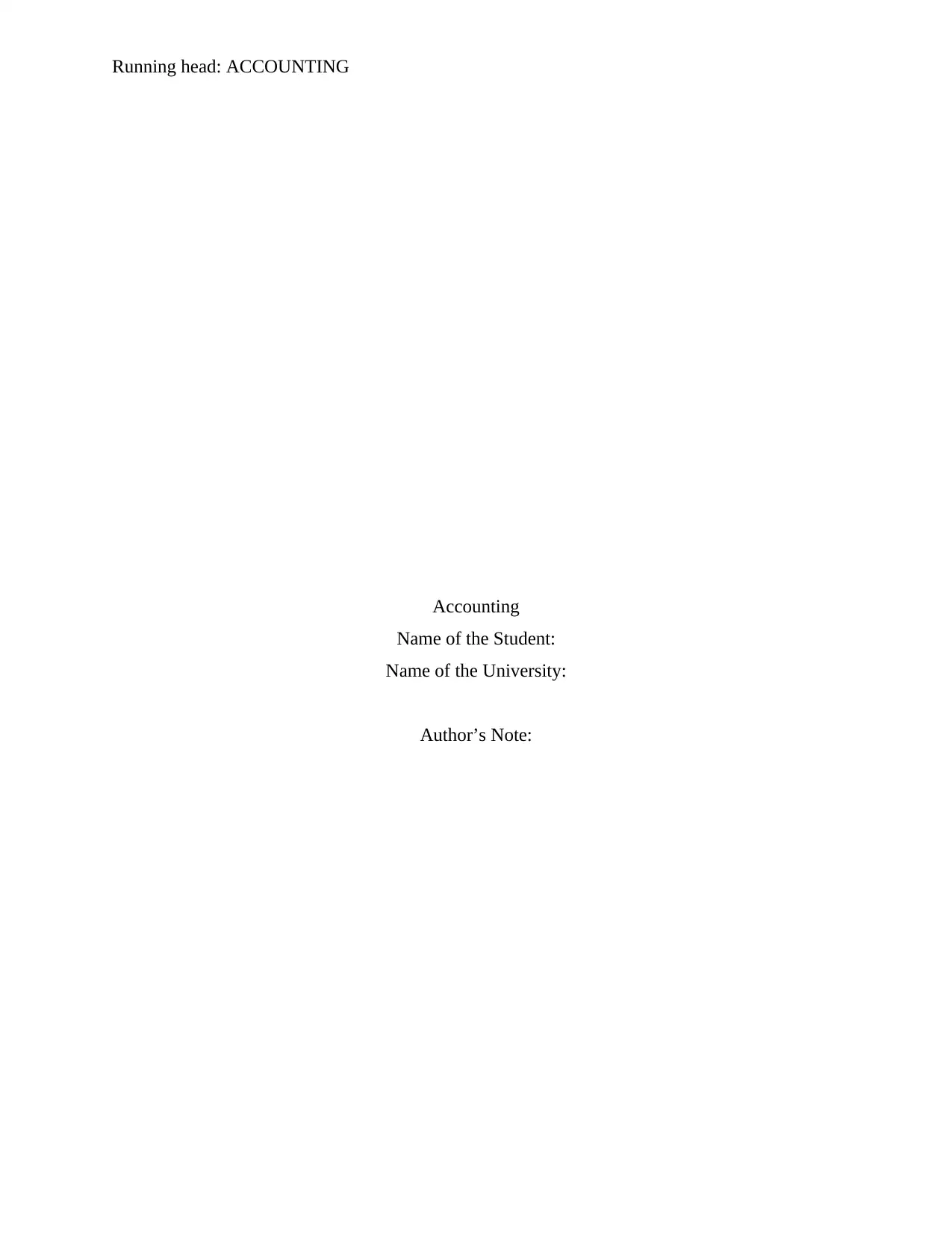
Running head: ACCOUNTING
Accounting
Name of the Student:
Name of the University:
Author’s Note:
Accounting
Name of the Student:
Name of the University:
Author’s Note:
Paraphrase This Document
Need a fresh take? Get an instant paraphrase of this document with our AI Paraphraser
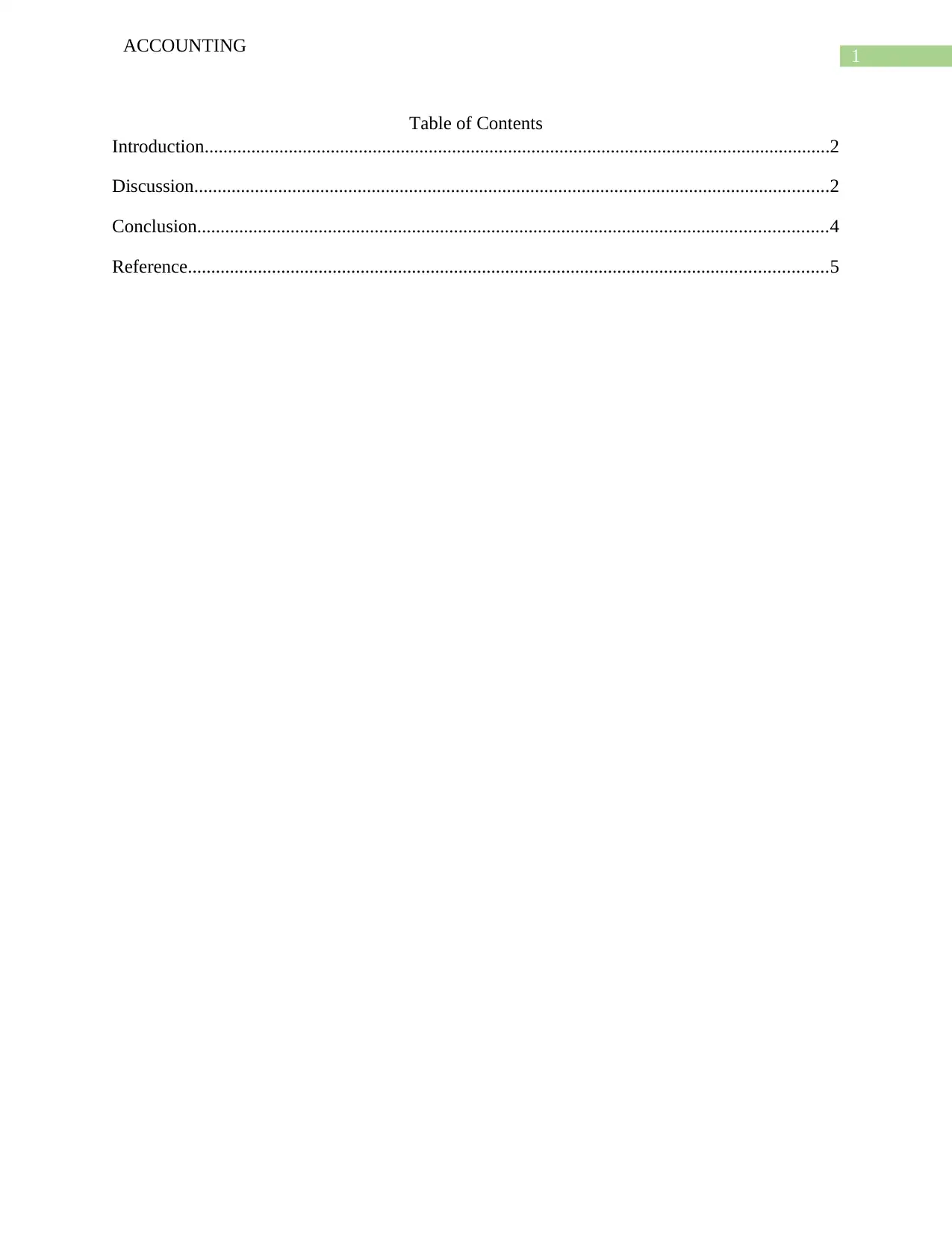
1
ACCOUNTING
Table of Contents
Introduction......................................................................................................................................2
Discussion........................................................................................................................................2
Conclusion.......................................................................................................................................4
Reference.........................................................................................................................................5
ACCOUNTING
Table of Contents
Introduction......................................................................................................................................2
Discussion........................................................................................................................................2
Conclusion.......................................................................................................................................4
Reference.........................................................................................................................................5
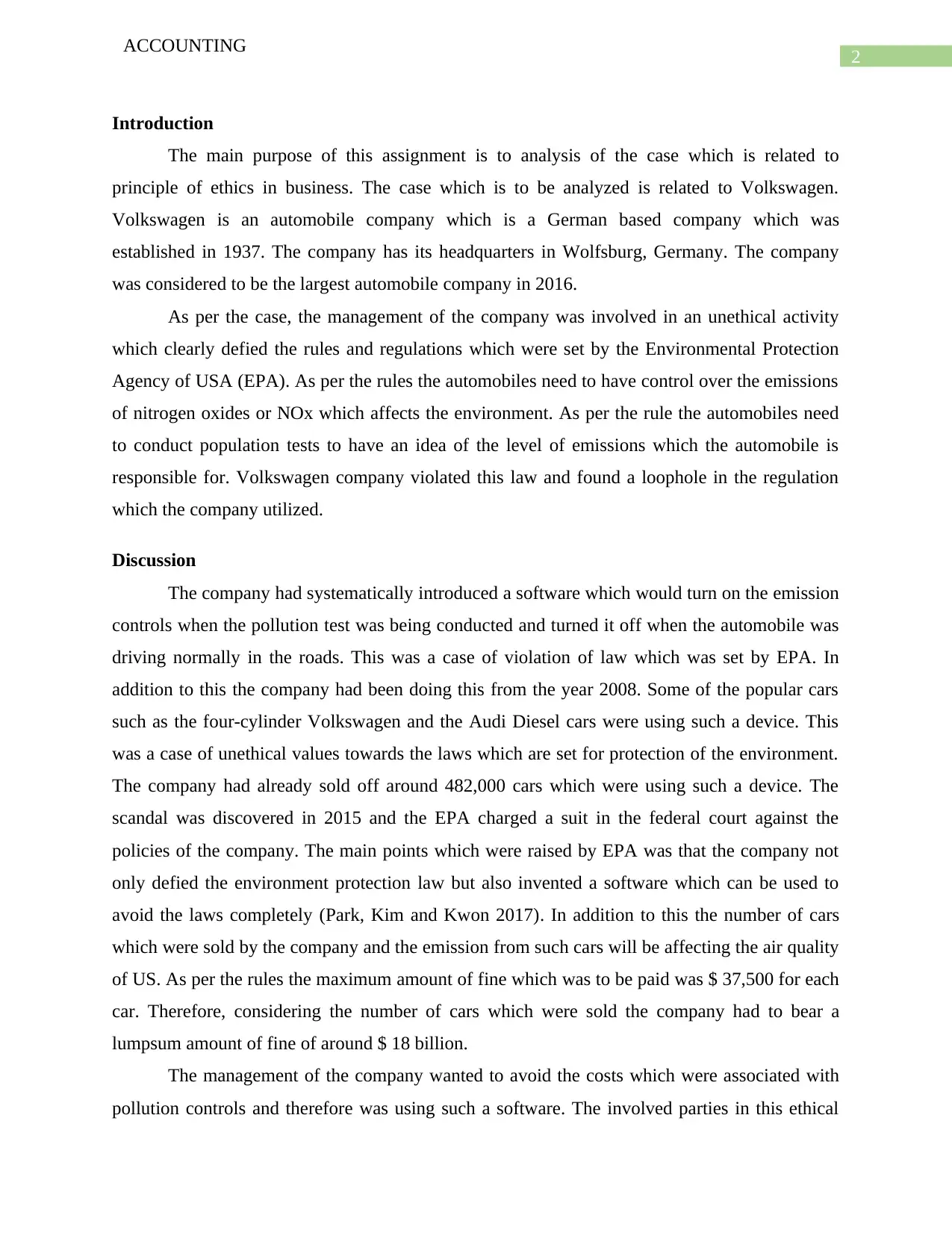
2
ACCOUNTING
Introduction
The main purpose of this assignment is to analysis of the case which is related to
principle of ethics in business. The case which is to be analyzed is related to Volkswagen.
Volkswagen is an automobile company which is a German based company which was
established in 1937. The company has its headquarters in Wolfsburg, Germany. The company
was considered to be the largest automobile company in 2016.
As per the case, the management of the company was involved in an unethical activity
which clearly defied the rules and regulations which were set by the Environmental Protection
Agency of USA (EPA). As per the rules the automobiles need to have control over the emissions
of nitrogen oxides or NOx which affects the environment. As per the rule the automobiles need
to conduct population tests to have an idea of the level of emissions which the automobile is
responsible for. Volkswagen company violated this law and found a loophole in the regulation
which the company utilized.
Discussion
The company had systematically introduced a software which would turn on the emission
controls when the pollution test was being conducted and turned it off when the automobile was
driving normally in the roads. This was a case of violation of law which was set by EPA. In
addition to this the company had been doing this from the year 2008. Some of the popular cars
such as the four-cylinder Volkswagen and the Audi Diesel cars were using such a device. This
was a case of unethical values towards the laws which are set for protection of the environment.
The company had already sold off around 482,000 cars which were using such a device. The
scandal was discovered in 2015 and the EPA charged a suit in the federal court against the
policies of the company. The main points which were raised by EPA was that the company not
only defied the environment protection law but also invented a software which can be used to
avoid the laws completely (Park, Kim and Kwon 2017). In addition to this the number of cars
which were sold by the company and the emission from such cars will be affecting the air quality
of US. As per the rules the maximum amount of fine which was to be paid was $ 37,500 for each
car. Therefore, considering the number of cars which were sold the company had to bear a
lumpsum amount of fine of around $ 18 billion.
The management of the company wanted to avoid the costs which were associated with
pollution controls and therefore was using such a software. The involved parties in this ethical
ACCOUNTING
Introduction
The main purpose of this assignment is to analysis of the case which is related to
principle of ethics in business. The case which is to be analyzed is related to Volkswagen.
Volkswagen is an automobile company which is a German based company which was
established in 1937. The company has its headquarters in Wolfsburg, Germany. The company
was considered to be the largest automobile company in 2016.
As per the case, the management of the company was involved in an unethical activity
which clearly defied the rules and regulations which were set by the Environmental Protection
Agency of USA (EPA). As per the rules the automobiles need to have control over the emissions
of nitrogen oxides or NOx which affects the environment. As per the rule the automobiles need
to conduct population tests to have an idea of the level of emissions which the automobile is
responsible for. Volkswagen company violated this law and found a loophole in the regulation
which the company utilized.
Discussion
The company had systematically introduced a software which would turn on the emission
controls when the pollution test was being conducted and turned it off when the automobile was
driving normally in the roads. This was a case of violation of law which was set by EPA. In
addition to this the company had been doing this from the year 2008. Some of the popular cars
such as the four-cylinder Volkswagen and the Audi Diesel cars were using such a device. This
was a case of unethical values towards the laws which are set for protection of the environment.
The company had already sold off around 482,000 cars which were using such a device. The
scandal was discovered in 2015 and the EPA charged a suit in the federal court against the
policies of the company. The main points which were raised by EPA was that the company not
only defied the environment protection law but also invented a software which can be used to
avoid the laws completely (Park, Kim and Kwon 2017). In addition to this the number of cars
which were sold by the company and the emission from such cars will be affecting the air quality
of US. As per the rules the maximum amount of fine which was to be paid was $ 37,500 for each
car. Therefore, considering the number of cars which were sold the company had to bear a
lumpsum amount of fine of around $ 18 billion.
The management of the company wanted to avoid the costs which were associated with
pollution controls and therefore was using such a software. The involved parties in this ethical
⊘ This is a preview!⊘
Do you want full access?
Subscribe today to unlock all pages.

Trusted by 1+ million students worldwide
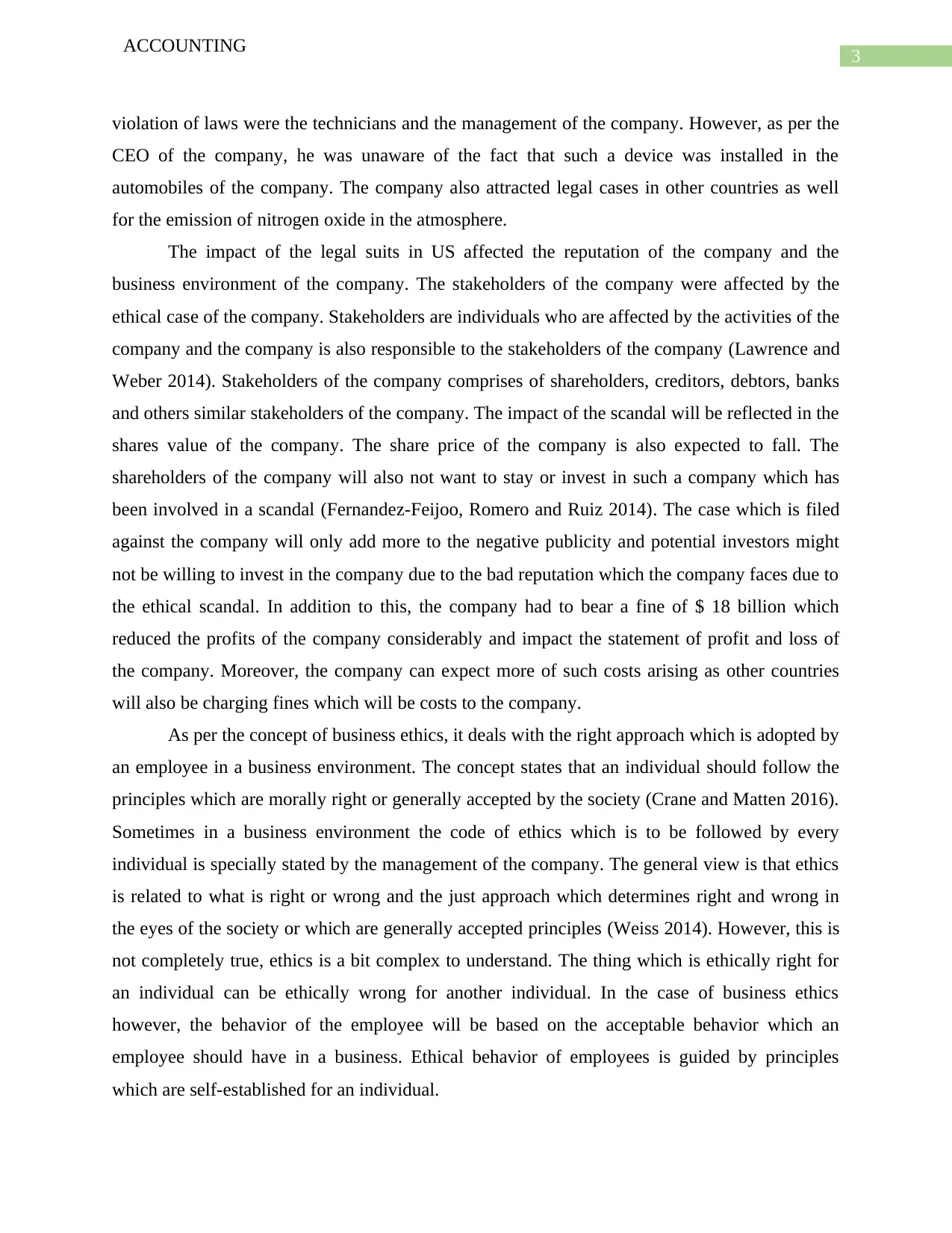
3
ACCOUNTING
violation of laws were the technicians and the management of the company. However, as per the
CEO of the company, he was unaware of the fact that such a device was installed in the
automobiles of the company. The company also attracted legal cases in other countries as well
for the emission of nitrogen oxide in the atmosphere.
The impact of the legal suits in US affected the reputation of the company and the
business environment of the company. The stakeholders of the company were affected by the
ethical case of the company. Stakeholders are individuals who are affected by the activities of the
company and the company is also responsible to the stakeholders of the company (Lawrence and
Weber 2014). Stakeholders of the company comprises of shareholders, creditors, debtors, banks
and others similar stakeholders of the company. The impact of the scandal will be reflected in the
shares value of the company. The share price of the company is also expected to fall. The
shareholders of the company will also not want to stay or invest in such a company which has
been involved in a scandal (Fernandez-Feijoo, Romero and Ruiz 2014). The case which is filed
against the company will only add more to the negative publicity and potential investors might
not be willing to invest in the company due to the bad reputation which the company faces due to
the ethical scandal. In addition to this, the company had to bear a fine of $ 18 billion which
reduced the profits of the company considerably and impact the statement of profit and loss of
the company. Moreover, the company can expect more of such costs arising as other countries
will also be charging fines which will be costs to the company.
As per the concept of business ethics, it deals with the right approach which is adopted by
an employee in a business environment. The concept states that an individual should follow the
principles which are morally right or generally accepted by the society (Crane and Matten 2016).
Sometimes in a business environment the code of ethics which is to be followed by every
individual is specially stated by the management of the company. The general view is that ethics
is related to what is right or wrong and the just approach which determines right and wrong in
the eyes of the society or which are generally accepted principles (Weiss 2014). However, this is
not completely true, ethics is a bit complex to understand. The thing which is ethically right for
an individual can be ethically wrong for another individual. In the case of business ethics
however, the behavior of the employee will be based on the acceptable behavior which an
employee should have in a business. Ethical behavior of employees is guided by principles
which are self-established for an individual.
ACCOUNTING
violation of laws were the technicians and the management of the company. However, as per the
CEO of the company, he was unaware of the fact that such a device was installed in the
automobiles of the company. The company also attracted legal cases in other countries as well
for the emission of nitrogen oxide in the atmosphere.
The impact of the legal suits in US affected the reputation of the company and the
business environment of the company. The stakeholders of the company were affected by the
ethical case of the company. Stakeholders are individuals who are affected by the activities of the
company and the company is also responsible to the stakeholders of the company (Lawrence and
Weber 2014). Stakeholders of the company comprises of shareholders, creditors, debtors, banks
and others similar stakeholders of the company. The impact of the scandal will be reflected in the
shares value of the company. The share price of the company is also expected to fall. The
shareholders of the company will also not want to stay or invest in such a company which has
been involved in a scandal (Fernandez-Feijoo, Romero and Ruiz 2014). The case which is filed
against the company will only add more to the negative publicity and potential investors might
not be willing to invest in the company due to the bad reputation which the company faces due to
the ethical scandal. In addition to this, the company had to bear a fine of $ 18 billion which
reduced the profits of the company considerably and impact the statement of profit and loss of
the company. Moreover, the company can expect more of such costs arising as other countries
will also be charging fines which will be costs to the company.
As per the concept of business ethics, it deals with the right approach which is adopted by
an employee in a business environment. The concept states that an individual should follow the
principles which are morally right or generally accepted by the society (Crane and Matten 2016).
Sometimes in a business environment the code of ethics which is to be followed by every
individual is specially stated by the management of the company. The general view is that ethics
is related to what is right or wrong and the just approach which determines right and wrong in
the eyes of the society or which are generally accepted principles (Weiss 2014). However, this is
not completely true, ethics is a bit complex to understand. The thing which is ethically right for
an individual can be ethically wrong for another individual. In the case of business ethics
however, the behavior of the employee will be based on the acceptable behavior which an
employee should have in a business. Ethical behavior of employees is guided by principles
which are self-established for an individual.
Paraphrase This Document
Need a fresh take? Get an instant paraphrase of this document with our AI Paraphraser
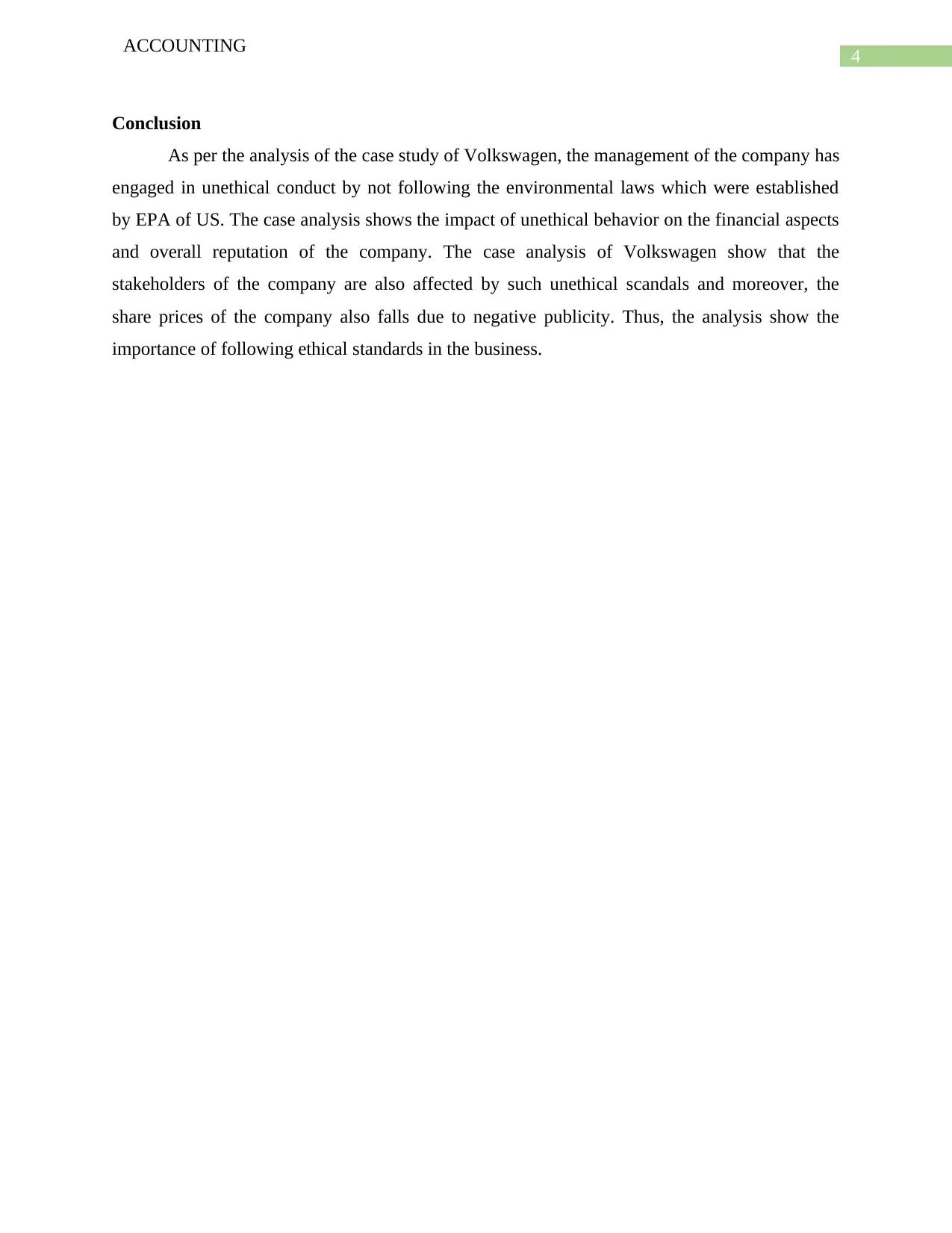
4
ACCOUNTING
Conclusion
As per the analysis of the case study of Volkswagen, the management of the company has
engaged in unethical conduct by not following the environmental laws which were established
by EPA of US. The case analysis shows the impact of unethical behavior on the financial aspects
and overall reputation of the company. The case analysis of Volkswagen show that the
stakeholders of the company are also affected by such unethical scandals and moreover, the
share prices of the company also falls due to negative publicity. Thus, the analysis show the
importance of following ethical standards in the business.
ACCOUNTING
Conclusion
As per the analysis of the case study of Volkswagen, the management of the company has
engaged in unethical conduct by not following the environmental laws which were established
by EPA of US. The case analysis shows the impact of unethical behavior on the financial aspects
and overall reputation of the company. The case analysis of Volkswagen show that the
stakeholders of the company are also affected by such unethical scandals and moreover, the
share prices of the company also falls due to negative publicity. Thus, the analysis show the
importance of following ethical standards in the business.
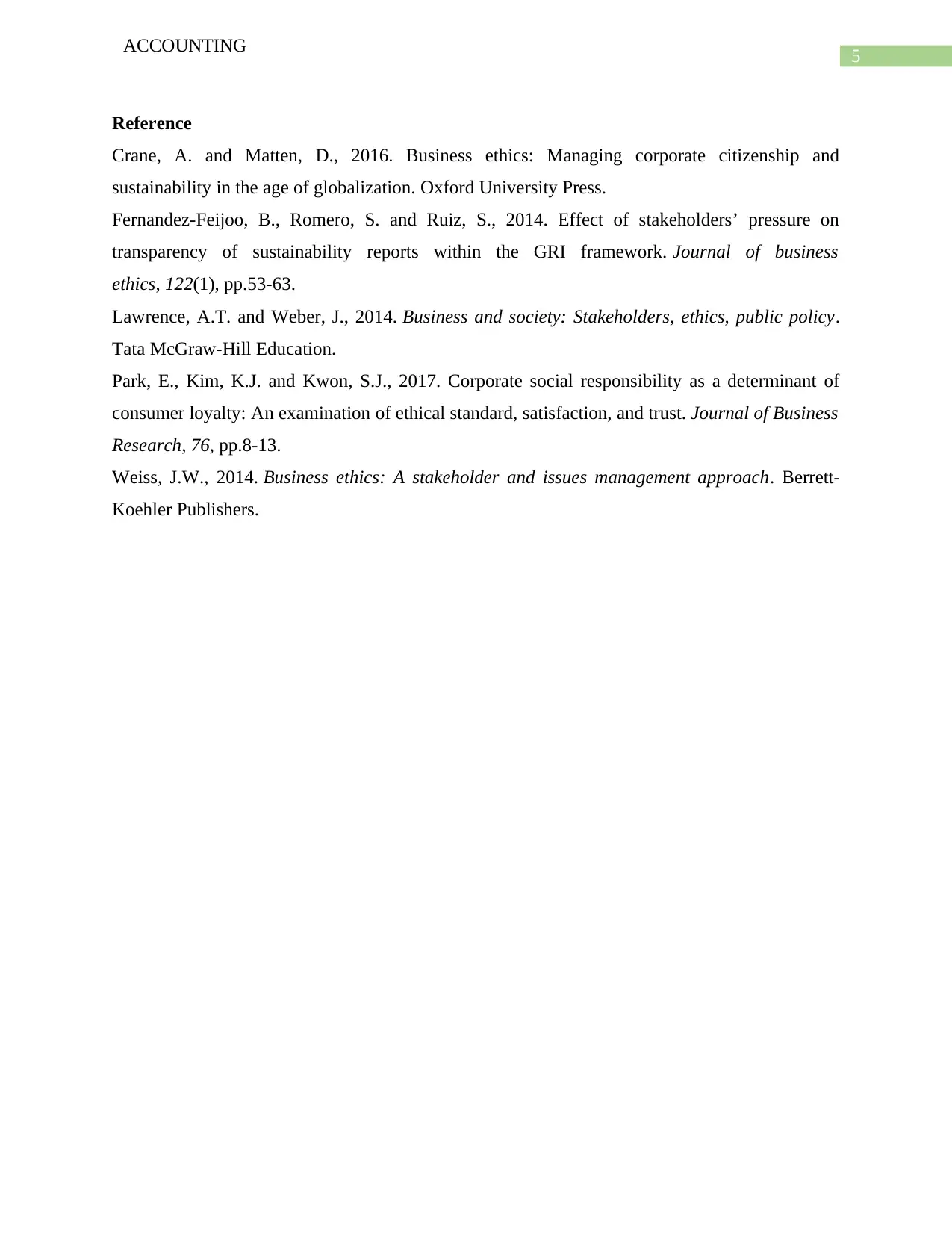
5
ACCOUNTING
Reference
Crane, A. and Matten, D., 2016. Business ethics: Managing corporate citizenship and
sustainability in the age of globalization. Oxford University Press.
Fernandez-Feijoo, B., Romero, S. and Ruiz, S., 2014. Effect of stakeholders’ pressure on
transparency of sustainability reports within the GRI framework. Journal of business
ethics, 122(1), pp.53-63.
Lawrence, A.T. and Weber, J., 2014. Business and society: Stakeholders, ethics, public policy.
Tata McGraw-Hill Education.
Park, E., Kim, K.J. and Kwon, S.J., 2017. Corporate social responsibility as a determinant of
consumer loyalty: An examination of ethical standard, satisfaction, and trust. Journal of Business
Research, 76, pp.8-13.
Weiss, J.W., 2014. Business ethics: A stakeholder and issues management approach. Berrett-
Koehler Publishers.
ACCOUNTING
Reference
Crane, A. and Matten, D., 2016. Business ethics: Managing corporate citizenship and
sustainability in the age of globalization. Oxford University Press.
Fernandez-Feijoo, B., Romero, S. and Ruiz, S., 2014. Effect of stakeholders’ pressure on
transparency of sustainability reports within the GRI framework. Journal of business
ethics, 122(1), pp.53-63.
Lawrence, A.T. and Weber, J., 2014. Business and society: Stakeholders, ethics, public policy.
Tata McGraw-Hill Education.
Park, E., Kim, K.J. and Kwon, S.J., 2017. Corporate social responsibility as a determinant of
consumer loyalty: An examination of ethical standard, satisfaction, and trust. Journal of Business
Research, 76, pp.8-13.
Weiss, J.W., 2014. Business ethics: A stakeholder and issues management approach. Berrett-
Koehler Publishers.
⊘ This is a preview!⊘
Do you want full access?
Subscribe today to unlock all pages.

Trusted by 1+ million students worldwide
1 out of 6
Related Documents
Your All-in-One AI-Powered Toolkit for Academic Success.
+13062052269
info@desklib.com
Available 24*7 on WhatsApp / Email
![[object Object]](/_next/static/media/star-bottom.7253800d.svg)
Unlock your academic potential
Copyright © 2020–2026 A2Z Services. All Rights Reserved. Developed and managed by ZUCOL.





